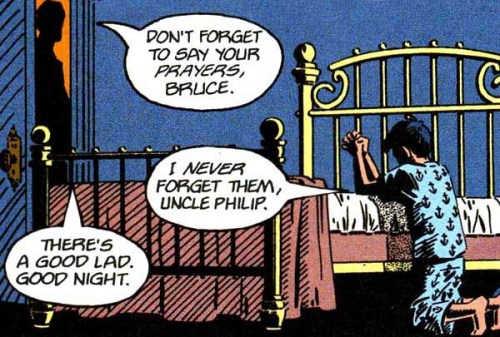Where Does Batman Get His Self Control?
Answering the question of where Batman’s self control comes from would be as complex as asking the same question regarding any one person. How he learned it in the first place is a different issue from why he maintains it as a adult. How he learned it: Behaviorists would say his parents and Alfred reinforced (rewarded) him for demonstrating self control. Bandura would say mastery experiences helped him feel capable and in control. Freud would attribute it to his toilet training. We can’t really know because the comics don’t depict many of the relevant early life experiences. He was already developing better than average self control before his parents died.
Relevant excerpt from chapter 12 of Batman and Psychology: A Dark and Stormy Knight:
Alfred’s parenting style (his general approach to childrearing) is mostly authoritative (not authoritarian), encouraging his surrogate son’s independence with warmth, nurturance, and verbal give-and-take, while also exerting authority, enforcing rules, and making maturity demands (expectations for age-appropriate conduct). Difficult as it may be to imagine Alfred telling Bruce at 10 or 11, “No, you may not,” Bruce’s social competence and self-control suggest that Alfred found ways to place limits and exert discipline, nothing corporal to be sure. The authoritative parent communicates well, listens receptively to the child’s questions and requests, and teaches through explanation. The authoritative parent teaches the child more than what to do or not do; this parent teaches the child to think about why. The fact that Bruce is so accustomed to getting his own way might suggest that Alfred and Bruce’s birth parents before him preferred to risk erring a little on the side of permissiveness.
A permissive parent sets no limits, fails to guide and discipline, and rarely controls, restricts, or punishes the child. Some permissive parents are warm and responsive, available to help the child without seeing themselves as responsible for shaping who that child will become (democratic-indulgent permissiveness), while others are distant, uninvolved, even ignorant about what the child does (rejecting-neglecting permissiveness). Bruce’s responsive, supportive father and more nurturing mother set limits, maybe not enough. Sam Hamm (screenwriter for Batman and Batman Returns) concluded that “Bruce had become Batman as a result of being spoiled. He had grown up with sufficient money and leisure to luxuriate in his own tragedy, to wallow in the false sense that it made him somehow unique. In other words, Bruce had never learned to cut his losses.” Bruce shows too much self-discipline to have been completely spoiled. Alfred likely applied authoritative guidance based on logic, ethics, and Bruce’s inherent guilt.
Bruce’s parents show strong maturity expectations for Bruce. They don’t speak down to him. They discuss grownup ideas with him, answering questions and explaining patiently.
In a journal entry in The Forensic Files of Batman (Doug Moench, 2004, p. 17), Bruce Wayne writes:
“And then, when they were under the ground, he became my guardian and friend, nagging constantly and sometimes caustically, never letting me neglect my schoolwork, always keeping my obsession in check. . . . With him, I remained driven but disciplined, anchored to vital reality through his sternness and arch humor, my soul tempered by his firm kindness and steadfast humanity.”
It has always seemed a bit like Bruce Wayne, for the most part, raised himself. After the murders, the boy Bruce takes control of his life. Alfred helps, but together they conspire to keep Bruce independent of everybody else.
From chapter 4 of Batman and Psychology: A Dark and Stormy Knight:
By most accounts, Bruce grew up expecting to operate within the law even while he also started cheating the system. To pursue justice unimpeded by well-intentioned adults who wanted to care either for him or for the orphan’s fortune, “He wrote letters that weren’t exactly forgeries and weren’t exactly anything else—and they enabled him to leave Gotham City at age 14 and begin a global quest for what he wanted to know.”
Some people, when traumatized by horrifying events that left them feeling helpless, give up and feel broadly helpless in many areas of life, possibly as a consequence of PTSD. Others, who react instead with posttraumatic growth, make meaning out of meaningless events by taking control of their lives. For Bruce Wayne, taking control and becoming fiercely independent help him cope. Control becomes integral to his self concept. To relinquish control would mean giving up part of himself and accepting the chaos of this world.
His self control has practical aspects as well. Law enforcement figures who work with Batman or at least tolerate the costumed vigilante – including Commissioner Gordon, some other police officers, and superpowered heroes – wouldn’t let him stay in the Bat-business if he lost control. As long as he has at least one rule he won’t break no matter what, those who could stop him will not.
In chapter 9, I discuss how Freud would have used Hamlet to illustrate why Batman shouldn’t kill, but explaining that takes more than a blog post.

In Post-Crisis reality, Alfred helped Bruce stay at Wayne Manor instead of moving to Uncle Philip’s place. In every reality, Bruce showed great motivation and self discipline. Even as a boy, he was a self-made man.
